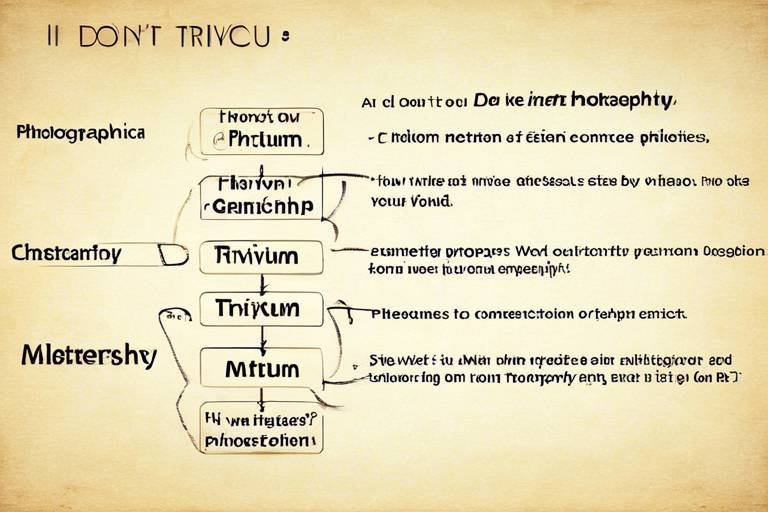Metaphysics and Material Science - A Philosophical Discourse
The intersection of metaphysics and material science is a fascinating realm where profound philosophical questions meet the empirical rigor of scientific inquiry. At its core, metaphysics seeks to understand the fundamental nature of reality—what it means to exist and how various entities relate to one another. On the other hand, material science focuses on the properties and behaviors of matter, employing scientific methods to explore the physical world. This article aims to unravel the intricate connections between these two fields, revealing how philosophical concepts can shape our scientific understanding and how scientific discoveries can, in turn, influence metaphysical thought.
Imagine standing at the edge of a vast ocean, with waves crashing against the shore. Each wave represents a different philosophical question, while the ocean itself symbolizes our collective understanding of reality. The tides of material science ebb and flow, bringing new insights that can either align with or challenge our metaphysical beliefs. This dynamic interplay invites us to delve deeper into questions such as: What is the essence of existence? How do we reconcile our sensory experiences with the scientific observations that define our understanding of the universe?
As we embark on this philosophical journey, we will explore several key themes, including the nature of reality, the role of perception, and the ethical implications of scientific advancements. By examining these themes through the lens of both metaphysics and material science, we can gain a richer understanding of our existence and the world around us. So, let’s dive in and uncover the layers of meaning that lie beneath the surface of both disciplines.
When we ponder the nature of reality, we encounter a myriad of metaphysical questions that challenge our understanding of existence. At its simplest, reality can be perceived through the lens of physical properties—the tangible attributes of matter that we can observe and measure. However, there exists a realm of abstract concepts that transcends mere physicality, inviting us to consider the underlying principles that govern the universe. Material science approaches these profound inquiries by employing empirical methods to investigate the properties of matter, yet it often grapples with the limitations of its own frameworks.
For instance, consider the concept of time. In material science, time is often viewed as a linear progression, measurable and quantifiable. Conversely, metaphysical discussions about time might explore its cyclical nature or the idea that time is an illusion altogether. This contrast highlights the rich tapestry of thought that emerges when we consider both metaphysical and scientific perspectives. The questions we ask about reality can lead us to deeper insights into our existence, prompting us to reflect on the very fabric of the universe.
Our understanding of reality is profoundly shaped by human perception. The way we experience the world through our senses influences our interpretations of reality and the conclusions we draw from scientific data. Philosophically, this raises important questions about the reliability of our sensory experiences. Are we merely passive observers of reality, or do our perceptions actively shape the world around us? This inquiry leads us to explore various philosophical perspectives on perception, including idealism and realism.
Idealism posits that reality is fundamentally mental or immaterial, suggesting that our perceptions create the world we experience. In contrast, realism asserts that an objective reality exists independent of our perceptions. These two perspectives inform scientific methodologies, influencing how researchers interpret data and formulate hypotheses. For example, scientists often rely on empirical evidence to validate their findings, seeking to minimize subjective biases that could distort their understanding of reality.
To grasp the implications of these perspectives, let’s consider a simple analogy. Think of a painter creating a masterpiece. An idealist might argue that the painting exists only in the mind of the artist until it is viewed by an observer. In contrast, a realist would contend that the painting has an existence independent of perception, existing as a tangible object in the material world. This debate is not merely academic; it has profound implications for scientific inquiry and our understanding of existence.
In material science, the emphasis on empirical evidence serves as a cornerstone for validating scientific claims. Scientists conduct experiments, gather data, and draw conclusions based on observable phenomena. However, the interpretation of this evidence is often influenced by the philosophical frameworks that underpin scientific inquiry. For instance, the way researchers conceptualize the relationship between observer and observed can shape their understanding of reality itself.
As we explore the scientific method, it becomes clear that this systematic approach to inquiry is deeply intertwined with philosophical thought. The scientific method relies on a series of steps—observation, hypothesis formulation, experimentation, and analysis—that guide researchers in their quest for knowledge. Yet, beneath this structured process lies a set of philosophical assumptions about the nature of reality, causality, and the limits of human understanding. By critically examining these assumptions, we can better appreciate the strengths and limitations of the scientific method in addressing the profound questions posed by metaphysics.
Ontology, the study of being, plays a crucial role in shaping our understanding of material science. The ontological assumptions we hold influence how we approach scientific practice and our interpretations of existence. For instance, a materialist perspective posits that only physical entities exist, while a dualist perspective acknowledges the existence of both physical and non-physical entities. These differing viewpoints can lead to divergent approaches in scientific research and philosophical discourse.
The debate between materialism and dualism raises essential questions about the nature of existence. Materialism asserts that everything can be explained in terms of matter and physical processes, while dualism posits that there are two distinct realms—physical and non-physical. This philosophical divide has significant implications for scientific inquiry, as it shapes the questions researchers ask and the methodologies they employ.
The ontological perspectives we adopt can guide our hypotheses, methodologies, and interpretations of findings in material science. For example, a researcher who embraces a materialist ontology may focus solely on physical phenomena, while a dualist may consider the interplay between mind and matter. This divergence highlights the importance of acknowledging our philosophical assumptions as we engage in scientific research.
As we navigate the complex landscape of material science, it is essential to consider the ethical dimensions of our work. Within a metaphysical framework, philosophical principles inform responsible scientific practice and guide our interactions with technology. The rapid advancements in material science raise critical questions about the impact of technology on society and the ethical responsibilities of scientists.
Philosophical ethics provides a foundation for evaluating the moral implications of scientific advancements. As we develop new technologies, we must consider the ethical considerations that arise from our actions. How do our metaphysical beliefs shape our understanding of right and wrong in the context of scientific research? By reflecting on these questions, we can cultivate a sense of responsibility that informs our approach to research and technology development.
The societal implications of technological advancements driven by material science cannot be overlooked. As we harness the power of science to create new tools and technologies, we must remain vigilant about their potential consequences. Responsible stewardship, informed by both scientific and philosophical insights, is essential for ensuring that our technological innovations benefit society as a whole.
- What is the relationship between metaphysics and material science? Metaphysics explores the fundamental nature of reality, while material science studies the properties and behaviors of matter. Together, they provide a comprehensive understanding of existence.
- How does perception influence scientific inquiry? Human perception shapes our understanding of reality and can affect how we interpret scientific data, leading to different conclusions based on philosophical frameworks.
- What are the ethical implications of material science? The rapid advancements in material science raise important ethical questions about the impact of technology on society and the responsibilities of scientists in their research.

The Nature of Reality
When we embark on the quest to understand the nature of reality, we find ourselves at the crossroads of philosophy and science. It’s like peering into a vast ocean, where the waves of metaphysical inquiry crash against the shores of material science. Reality, in its essence, is not merely what we can touch or see; it encompasses a multitude of concepts that challenge our perceptions and understanding. At the heart of this exploration lies a fundamental question: What is real?
Material science primarily deals with the physical properties of matter, focusing on what can be measured and observed. However, metaphysics dives deeper, asking questions that material science often overlooks. For instance, while a physicist might describe the behavior of particles at the quantum level, a metaphysician might ponder the implications of those particles' existence. Are they merely components of a larger system, or do they possess some intrinsic reality that transcends their physical properties?
To grasp the nature of reality, we must first distinguish between physical properties and abstract concepts. The former includes measurable attributes like mass, volume, and energy, which can be empirically tested and validated. The latter, however, encompasses ideas such as existence, consciousness, and identity—elements that elude direct measurement yet profoundly influence our understanding of the universe. This intricate dance between the tangible and the intangible is what makes the study of reality so fascinating.
One way to visualize this relationship is through a
| Aspect | Material Science | Metaphysics |
|---|---|---|
| Focus | Physical properties of matter | Abstract concepts of existence |
| Methodology | Empirical observation and experimentation | Philosophical reasoning and speculation |
| Key Questions | What can be measured? | What does it mean to exist? |
| Outcome | Scientific theories and laws | Philosophical insights and dilemmas |
As we navigate these waters, we realize that both material science and metaphysics are crucial for a comprehensive understanding of reality. They are like two sides of the same coin, each offering unique insights that complement one another. While material science provides the tools to explore the physical universe, metaphysics challenges us to consider the implications of our findings. It’s a relationship that invites us to question not only what is real but also how we perceive that reality.
In conclusion, the nature of reality is a complex tapestry woven from threads of physical evidence and abstract thought. As we continue to explore this intricate interplay, we uncover not just the mechanics of the universe but also the profound questions that define our existence. Are we merely observers in a grand cosmic play, or do we hold the power to shape reality itself? This philosophical discourse will undoubtedly continue to evolve as our understanding deepens, revealing ever more layers of meaning in the quest for truth.
- What is the difference between metaphysics and material science?
Metaphysics focuses on abstract concepts and questions about existence, while material science deals with the physical properties of matter and empirical observations. - How do philosophical concepts influence scientific understanding?
Philosophical concepts can shape the questions scientists ask and the interpretations they make of their data, providing context and meaning to their findings. - Can we truly understand reality through science alone?
While science provides valuable insights into the physical world, metaphysical inquiry is essential for addressing deeper existential questions that science may not fully answer.

The Role of Perception
When we think about the world around us, our minds are like windows through which we view reality. But what if those windows are tinted? The role of perception in shaping our understanding of reality is a profound topic that intertwines philosophy and science. Our sensory experiences—what we see, hear, touch, taste, and smell—are the primary means through which we engage with the world. Yet, these experiences are not merely passive receptions of information; they are active interpretations influenced by our beliefs, emotions, and cultural backgrounds. This raises a critical question: how much of what we perceive is actually 'real' versus a construction of our minds?
In the realm of material science, perception plays a pivotal role in how scientists gather data and draw conclusions. When researchers conduct experiments, they rely on their senses to observe phenomena. However, the interpretation of these observations can vary significantly based on individual perspectives. For instance, two scientists might interpret the same set of data differently, leading to divergent conclusions. This subjectivity can create a fascinating interplay between empirical evidence and philosophical inquiry, highlighting the importance of being aware of our perceptual biases.
Moreover, the philosophical implications of perception extend into various schools of thought. Idealism posits that reality is mentally constructed, emphasizing the significance of perception in shaping our understanding of existence. Conversely, realism argues that an objective reality exists independent of our perceptions. This dichotomy raises intriguing questions about the reliability of our senses and whether we can ever truly know the material world as it is. Are we merely interpreting shadows on the wall of a cave, as Plato suggested, or are we capable of grasping the essence of reality through our observations?
To further illustrate the complexity of perception in the context of material science, consider the following table that summarizes key differences between idealism and realism:
| Aspect | Idealism | Realism |
|---|---|---|
| Nature of Reality | Constructed by the mind | Exists independently of perception |
| Role of Perception | Central to understanding | Secondary to objective observation |
| Examples | Philosophical idealism, subjective experiences | Scientific realism, empirical evidence |
In addition to philosophical perspectives, the importance of empirical evidence in material science cannot be overstated. Scientists rely on measurable data to validate their hypotheses, yet the interpretation of this data is often colored by personal and cultural perceptions. This interaction between empirical evidence and perception invites us to consider: how can we ensure that our scientific inquiries remain objective while acknowledging the subjective nature of our experiences?
As we navigate this intricate landscape, it's essential to recognize that our perception is not just a window to the world but also a lens that can distort our understanding. By engaging with both philosophical frameworks and scientific methodologies, we can strive for a more nuanced comprehension of reality. Ultimately, the role of perception challenges us to question our assumptions and explore the rich interplay between what we observe and how we interpret those observations.
- What is the difference between perception and reality? Perception is how we interpret sensory information, while reality refers to the objective existence of things, independent of our interpretations.
- How does perception influence scientific inquiry? Perception can shape the way scientists interpret data and formulate hypotheses, leading to potential biases in their conclusions.
- Can we trust our senses to understand the material world? While our senses provide valuable information, they can also be misleading. It's crucial to combine sensory experiences with empirical evidence for a more accurate understanding.

Philosophical Perspectives
When we dive into the realm of , we uncover a rich tapestry of ideas that shape our understanding of perception and reality. At the core of this exploration are two prominent schools of thought: idealism and realism. These philosophical frameworks not only inform our interpretation of sensory experiences but also guide scientific methodologies and the way we interpret empirical data.
Idealism posits that reality is fundamentally mental or immaterial. In this view, the material world is seen as a construct of our consciousness. Think about it: when you close your eyes and imagine a vibrant landscape, does that scene not exist in your mind? Idealists argue that our perceptions shape our reality, suggesting that the universe is a reflection of our thoughts and ideas. This perspective can lead to a more subjective understanding of the world, where truth is not an absolute but rather a fluid concept influenced by individual experience.
On the flip side, we have realism, which asserts that the material world exists independently of our perceptions. Realists believe that there is an objective reality that can be understood through observation and experimentation. Imagine a scientist peering through a microscope; they are not merely interpreting images formed in their mind, but rather uncovering truths about the microscopic world that exist regardless of human perception. This perspective emphasizes the importance of empirical evidence and the belief that knowledge is grounded in observable phenomena.
These two perspectives often clash, leading to intriguing debates within both philosophical and scientific communities. For instance, how does one reconcile the subjective nature of human experience with the objective findings of material science? This question is crucial, as it influences everything from scientific inquiry to the interpretation of data. In fact, many scientific methodologies are designed with these philosophical perspectives in mind, often leaning towards realism while still acknowledging the subjective nuances of human experience.
To further illustrate the relationship between these perspectives and their implications for scientific methodologies, consider the following table:
| Perspective | Key Characteristics | Implications for Science |
|---|---|---|
| Idealism |
|
Encourages exploration of consciousness and subjective experience. |
| Realism |
|
Focuses on empirical evidence and reproducibility of findings. |
Ultimately, the interplay between idealism and realism creates a dynamic landscape where philosophical inquiry and scientific investigation converge. This relationship prompts us to ask deeper questions: How do our beliefs influence our scientific endeavors? Can we ever truly separate our perceptions from the reality we seek to understand? As we navigate these philosophical waters, we gain invaluable insights that enrich both our scientific and existential explorations.
- What is the main difference between idealism and realism?
Idealism suggests that reality is shaped by our perceptions, while realism posits that an objective reality exists independently of our perceptions. - How do these philosophical perspectives influence scientific research?
These perspectives guide methodologies, interpretations of data, and the overall approach to understanding the material world. - Can one perspective be more valid than the other?
Validity often depends on the context; both perspectives offer valuable insights and can coexist in scientific discourse.

Idealism vs. Realism
The philosophical debate between idealism and realism serves as a cornerstone in understanding our perception of reality and the material world. At its core, idealism posits that reality is fundamentally mental, suggesting that our thoughts and perceptions shape the world around us. In contrast, realism argues that the material world exists independently of our perceptions, asserting that objects have an existence outside of our consciousness. This dichotomy raises intriguing questions: Are we merely observers of a pre-existing reality, or do our minds actively construct the world we experience?
To illustrate this debate, let's consider a simple analogy: think of a painting. An idealist might argue that the beauty and meaning of the painting derive from the viewer's interpretation and emotional response, while a realist would assert that the painting exists as a tangible object, regardless of who is looking at it. This fundamental difference in perspective not only influences philosophical discussions but also has profound implications for scientific inquiry.
In the realm of material science, these two perspectives shape methodologies and interpretations. For instance, a scientist operating from a realist standpoint would prioritize empirical evidence and observable phenomena, believing that experiments can lead to objective truths about the material world. On the other hand, an idealist might focus on how theories and models are constructed based on human cognition and experience, arguing that our understanding of reality is inherently subjective.
This clash between idealism and realism also has practical implications in scientific research. When formulating hypotheses, researchers must consider whether they are approaching their inquiries from a standpoint that acknowledges the independent existence of the material world or one that emphasizes the role of human perception in shaping scientific knowledge. Understanding these philosophical underpinnings can lead to more nuanced interpretations of data and findings.
Ultimately, the debate between idealism and realism is not just an academic exercise; it has real-world consequences. As we navigate the complexities of scientific advancements and technological innovations, recognizing the interplay between our perceptions and the material world can help us develop a more comprehensive understanding of both our existence and the universe we inhabit.
- What is idealism? Idealism is a philosophical viewpoint that asserts that reality is mentally constructed and that our perceptions shape our understanding of the material world.
- What is realism? Realism posits that objects and phenomena exist independently of our perceptions, emphasizing the importance of empirical evidence in understanding reality.
- How do idealism and realism influence science? These perspectives guide scientific methodologies and interpretations, affecting how researchers formulate hypotheses and analyze data.
- Why is the idealism vs. realism debate important? Understanding this debate helps clarify the philosophical foundations of scientific inquiry and can lead to more informed interpretations of research findings.

Empirical Evidence
When we talk about , we're diving into the very heart of what makes material science tick. Empirical evidence refers to knowledge that comes from observation and experience, rather than from theory or pure logic. It’s like the backbone of scientific inquiry, providing the data and observations that researchers rely on to formulate hypotheses and draw conclusions. But how does this empirical approach interact with our philosophical interpretations of reality? That's where things get really interesting!
In the realm of material science, empirical evidence serves as the bridge between theoretical concepts and the tangible world. Scientists conduct experiments, gather data, and observe natural phenomena, all in an effort to understand the underlying principles that govern our universe. For instance, when physicists study the behavior of particles at a subatomic level, they rely heavily on empirical methods to validate their theories. This process can be likened to a detective piecing together clues to solve a mystery; each piece of evidence brings us closer to the truth.
However, the interpretation of empirical evidence is not always straightforward. Philosophical frameworks, such as idealism and realism, play a significant role in how scientists understand their findings. For example, a realist might argue that the data collected from experiments reflects an objective reality, while an idealist might contend that our perceptions shape the reality we experience. This divergence in thought can lead to different interpretations of the same empirical evidence, which raises some intriguing questions:
- How do our beliefs about reality influence our scientific practices?
- Can empirical evidence ever be completely free from bias?
- What happens when empirical findings contradict our philosophical beliefs?
To illustrate this further, let’s consider the scientific method. It is fundamentally based on the collection of empirical evidence through observation and experimentation. Yet, the assumptions we make before we even begin our experiments can shape the outcomes. For instance, if a scientist approaches a study with the belief that certain phenomena are purely material, they may overlook other factors that could be at play. This interplay between empirical evidence and philosophical interpretation is what makes the pursuit of knowledge both challenging and fascinating.
Moreover, the importance of empirical evidence extends beyond just validating theories; it also influences the direction of future research. When scientists publish their findings, they contribute to a larger body of knowledge that can inspire new questions and investigations. This cyclical relationship between empirical evidence and philosophical inquiry not only enhances our understanding of material science but also invites us to reflect on our own beliefs about existence and reality.
In conclusion, empirical evidence is not merely a collection of data points; it is a dynamic force that interacts with our philosophical perspectives, shaping our understanding of the material world. As we continue to explore the depths of material science, we must remain aware of the philosophical implications that accompany our empirical findings, ensuring that we approach our inquiries with both rigor and an open mind.
- What is empirical evidence? Empirical evidence refers to knowledge acquired through observation and experimentation rather than theory.
- How does philosophy influence scientific inquiry? Philosophical frameworks shape how scientists interpret empirical evidence and guide their research methodologies.
- Can empirical data be biased? Yes, biases can influence how data is collected and interpreted, affecting the conclusions drawn from empirical evidence.

Scientific Methodology
The scientific methodology is often viewed as the backbone of material science, providing a structured approach to inquiry that enables researchers to explore the complexities of the material world. At its core, the scientific method is a systematic process that involves observation, hypothesis formulation, experimentation, analysis, and conclusion. This process not only serves to validate or refute theories but also plays a crucial role in shaping our understanding of reality itself. Have you ever wondered how scientists transition from mere curiosity to groundbreaking discoveries? It all begins with the scientific method.
In the realm of material science, the scientific methodology is particularly essential because it allows for the rigorous testing of ideas against observable phenomena. For instance, when a scientist posits a hypothesis about the properties of a new material, they will conduct experiments to gather empirical data. This data serves as the foundation upon which further inquiries are built, leading to a deeper understanding of the material's behavior under various conditions. The iterative nature of this process—where hypotheses are continually tested and refined—mirrors the philosophical quest for knowledge, blurring the lines between empirical science and metaphysical exploration.
One of the fascinating aspects of the scientific methodology is its ability to adapt and evolve. As new technologies emerge and our understanding of the universe deepens, the methods scientists use to gather and interpret data also change. For example, the advent of advanced imaging techniques has revolutionized how material scientists observe atomic structures, allowing them to visualize phenomena that were previously beyond reach. This evolution raises intriguing questions: How do these advancements influence our metaphysical understanding of existence? Are we merely uncovering the layers of reality, or are we shaping it through our observations?
Moreover, the scientific method is not without its philosophical underpinnings. It embodies a form of realism, where the existence of an objective reality is assumed, and knowledge is derived through sensory experience and empirical evidence. However, this raises important considerations about the limitations of human perception. Can we truly grasp the entirety of reality through our senses, or are we merely scratching the surface? This philosophical contemplation invites us to reflect on the relationship between our empirical observations and the abstract concepts that underpin them.
To illustrate the interplay between scientific methodology and philosophical inquiry, consider the following table that outlines key stages of the scientific method alongside their philosophical implications:
| Stage of Scientific Method | Explanation | Philosophical Implications |
|---|---|---|
| Observation | Gathering data through sensory experiences. | Challenges the reliability of perception. |
| Hypothesis | Formulating a testable statement based on observations. | Reflects the interplay of creativity and logic. |
| Experimentation | Conducting tests to validate or refute the hypothesis. | Raises questions about causality and determinism. |
| Analysis | Interpreting data to draw conclusions. | Highlights the role of subjectivity in interpretation. |
| Conclusion | Summarizing findings and proposing further research. | Encourages ongoing inquiry and skepticism. |
In conclusion, the scientific methodology serves as a vital bridge between material science and metaphysical inquiry. It not only fosters a deeper understanding of the material world but also invites us to question the very nature of reality. As we continue to explore this intersection, we must remain mindful of the philosophical implications that accompany our scientific endeavors. After all, the quest for knowledge is as much about understanding the universe around us as it is about grappling with the profound questions of existence.
- What is the scientific method? The scientific method is a systematic process used by scientists to explore observations, formulate hypotheses, conduct experiments, and draw conclusions based on empirical evidence.
- How does the scientific method relate to philosophy? The scientific method is rooted in philosophical principles, particularly realism, which assumes the existence of an objective reality that can be understood through empirical observation.
- Why is empirical evidence important in material science? Empirical evidence is crucial in material science as it provides the data needed to validate or refute hypotheses, guiding researchers in their understanding of material properties and behaviors.

Ontology in Material Science
Ontology, the philosophical study of being, plays a crucial role in shaping our understanding of material science. It delves into the very essence of existence, questioning what it means for something to "be." In the realm of material science, ontology influences how scientists conceptualize materials, their properties, and their interactions. This philosophical inquiry is not merely abstract; it has tangible implications for research methodologies and scientific practices. For instance, when a scientist investigates the properties of a new material, they are not just looking at empirical data; they are also making ontological assumptions about what that material is and how it fits into the broader framework of existence.
At its core, ontology in material science raises several fundamental questions:
- What constitutes the essence of a material?
- How do we differentiate between physical properties and the underlying reality of those materials?
- What role do abstract concepts, such as energy and force, play in our understanding of material existence?
These questions are not just academic; they have profound implications for how we conduct experiments and interpret results. For example, if a scientist adopts a materialist ontology, they might focus solely on the physical properties and behaviors of materials, potentially overlooking the more abstract properties that could inform their understanding. Conversely, a dualist perspective might encourage a more holistic view, considering both the physical and metaphysical aspects of materials.
Moreover, the ontological assumptions we hold can shape the direction of research itself. If researchers believe that materials are merely aggregates of particles, they may prioritize certain types of experiments over others. On the other hand, if they accept that materials possess intrinsic properties that transcend their physical manifestations, this could lead to innovative approaches that explore the interconnectedness of materials, energy, and consciousness.
In summary, ontology in material science is a rich and complex field that merits careful consideration. By examining the ontological foundations of material science, we can gain deeper insights into the nature of existence and the universe, ultimately leading to more informed scientific practices and a greater understanding of reality.
- What is ontology?
Ontology is the branch of philosophy that studies the nature of being, existence, and reality. - How does ontology relate to material science?
Ontology influences how scientists understand materials, guiding their research methodologies and interpretations of findings. - What are some ontological perspectives in material science?
Common perspectives include materialism, which focuses on physical properties, and dualism, which considers both physical and metaphysical aspects of materials. - Why is understanding ontology important for scientific research?
Understanding ontology helps researchers make informed decisions about their hypotheses, methodologies, and interpretations of data.

Materialism vs. Dualism
When we dive into the philosophical waters of materialism and dualism, we're essentially grappling with two fundamentally different views of existence. Materialism posits that everything that exists is made up of matter; in other words, the physical world is all there is. This perspective aligns with the principles of material science, which focuses on empirical evidence and observable phenomena. On the flip side, dualism introduces a fascinating twist, suggesting that there are two distinct realms: the physical and the non-physical (often referred to as the mind or spirit). This dichotomy raises intriguing questions about consciousness, identity, and the very fabric of reality.
To illustrate the contrast between these two philosophies, consider the following points:
- Materialism: Advocates argue that all phenomena, including thoughts and emotions, can be explained through physical processes. For example, when you feel happiness, materialists would assert that it’s a result of chemical reactions in the brain.
- Dualism: Proponents of this view contend that mental states cannot be fully explained by physical processes alone. They argue that consciousness and subjective experiences are separate from the physical brain, leading to the idea that the mind exists independently of the body.
This debate has significant implications for scientific inquiry. Materialists often emphasize the importance of empirical data and observable phenomena, relying on the scientific method to validate their claims. In contrast, dualists may argue that certain aspects of human experience—like emotions, beliefs, and consciousness—cannot be captured by scientific measurements alone. This divergence prompts essential questions: Can science truly explain the essence of human experience? Or are there elements of our existence that remain beyond the reach of empirical investigation?
Moreover, the materialism vs. dualism discourse influences how we interpret scientific findings in fields such as psychology, neuroscience, and even quantum physics. For instance, the rise of neuroscience has led many to adopt a materialist viewpoint, suggesting that understanding the brain will eventually unlock the mysteries of the mind. However, dualists challenge this notion, positing that the mind's complexities can't be reduced to mere brain activity.
Ultimately, the tension between materialism and dualism invites us to reflect on our understanding of reality. Are we merely complex biological machines, or is there something more profound that defines our existence? This philosophical inquiry not only shapes our scientific endeavors but also influences our ethical considerations, as we navigate the responsibilities that come with our growing understanding of the material world.
- What is materialism? Materialism is the philosophical view that everything that exists is made of matter, and all phenomena can be explained through physical processes.
- What is dualism? Dualism is the belief that there are two distinct realms: the physical (matter) and the non-physical (mind or spirit).
- How do materialism and dualism influence scientific research? Materialism emphasizes empirical evidence and observable phenomena, while dualism raises questions about consciousness and subjective experiences that may not be fully explained by science.
- Can science explain consciousness? This is a contentious issue; while materialists believe it can be explained through brain activity, dualists argue that consciousness may transcend physical explanations.

Implications for Research
The implications of ontological perspectives for scientific research are profound and multifaceted. When we delve into the realm of material science, we find that our fundamental beliefs about existence shape the very fabric of our investigations. For instance, if we subscribe to a materialist ontology, we might approach scientific questions with the assumption that everything can be explained through physical processes and interactions. This perspective encourages a rigorous examination of empirical data, seeking to uncover the underlying mechanisms of the universe. However, it can also lead to a reductionist view that overlooks the complexities of experience and consciousness.
On the other hand, a dualist perspective, which posits that both material and immaterial substances exist, invites researchers to consider dimensions of reality that extend beyond mere physicality. This can open up new avenues for inquiry, especially in fields like psychology and cognitive science, where understanding the interplay between the mind and body is crucial. Researchers may then be compelled to design studies that account for both physical and mental phenomena, enriching our understanding of human experience.
Moreover, ontological assumptions guide the formulation of hypotheses and the selection of methodologies. For example, a researcher who believes in the primacy of material existence may prioritize quantitative methods, relying heavily on statistical analysis to validate findings. In contrast, someone influenced by a more holistic or qualitative approach might employ case studies or ethnographic methods to capture the richness of human experience.
To illustrate this, consider the following table that summarizes the implications of different ontological perspectives on research methodologies:
| Ontological Perspective | Research Methodology | Focus of Inquiry |
|---|---|---|
| Materialism | Quantitative | Physical processes and empirical data |
| Dualism | Qualitative | Interplay between mind and body |
| Idealism | Philosophical analysis | Conceptual frameworks and perceptions |
Ultimately, the implications of these ontological views extend beyond the laboratory. They influence how findings are interpreted and communicated to the public. Scientists must navigate the delicate balance between presenting their work as objective truth while acknowledging the subjective frameworks that shape their understanding. This interplay of philosophy and science is crucial, as it fosters a more comprehensive view of reality that respects both empirical evidence and the rich tapestry of human experience.
In conclusion, the ontological perspectives we adopt not only shape our research inquiries but also impact the broader scientific discourse. By recognizing and reflecting on these implications, researchers can cultivate a more nuanced understanding of their work, ultimately enriching the field of material science and our collective quest for knowledge.
- What is the significance of ontology in scientific research? Ontology influences how researchers conceptualize existence, guiding their methodologies and interpretations.
- How do materialism and dualism differ in research approaches? Materialism focuses on empirical data and quantitative methods, while dualism encourages exploration of both physical and mental phenomena.
- Can philosophical perspectives affect the interpretation of scientific findings? Yes, the philosophical lens through which findings are viewed can significantly shape their meaning and implications.

Ethics and Responsibility
In the realm of material science, the intersection of ethics and responsibility is not just a theoretical concern; it is a pressing reality that shapes how scientists and researchers engage with their work. As we delve deeper into the implications of scientific advancements, we must confront the ethical dilemmas that arise from our discoveries and innovations. The question isn't merely about what we can do with technology, but rather, what should we do? This distinction is crucial, as it guides us toward responsible practices that consider the broader impacts of our work on society and the environment.
Philosophical principles play a significant role in informing our ethical frameworks. For instance, the concept of utilitarianism—which advocates for actions that maximize overall happiness—can be applied to assess the outcomes of scientific research. However, this approach can lead to challenging scenarios where the benefits for the majority might come at a significant cost to a minority. Such dilemmas compel us to consider alternative ethical theories, like deontological ethics, which emphasizes the importance of following moral rules, regardless of the consequences.
As we explore these ethical dimensions, we must also consider the impact of technology on society. The rapid advancements driven by material science have transformed our lives in countless ways, from medical breakthroughs to environmental innovations. Yet, with great power comes great responsibility. It is essential to foster a culture of ethical awareness among scientists and researchers, ensuring that they are not only equipped with technical skills but also with a robust understanding of the ethical implications of their work. This includes:
- Recognizing the potential consequences of new technologies.
- Engaging in transparent communication with the public about research goals and outcomes.
- Prioritizing sustainability and environmental stewardship in all scientific endeavors.
Moreover, the role of regulatory bodies and ethical committees cannot be overstated. These institutions serve as guardians of ethical standards, guiding researchers in navigating the complex landscape of scientific inquiry. They help ensure that research is conducted responsibly, with a keen eye on the potential ramifications for individuals and communities. This oversight is particularly vital in fields like genetic engineering and artificial intelligence, where the stakes are incredibly high.
Ultimately, the dialogue between ethics and material science is ongoing and dynamic. As new challenges emerge, so too must our ethical frameworks evolve. It is essential for scientists, ethicists, and society at large to engage in this discourse, fostering a collaborative approach to addressing the ethical dimensions of scientific progress. By doing so, we not only enhance the integrity of our scientific endeavors but also contribute to a more equitable and responsible future.
- What is the importance of ethics in material science?
Ethics in material science ensures that scientific advancements are conducted responsibly, considering their potential impact on society and the environment. - How do philosophical principles influence scientific research?
Philosophical principles provide a framework for evaluating the moral implications of research, guiding scientists in making ethical decisions. - What role do regulatory bodies play in ethical scientific practice?
Regulatory bodies establish guidelines and standards that help ensure research is conducted ethically and responsibly.

Philosophical Ethics
When we dive into the realm of , we uncover a rich tapestry of thought that intertwines with the advancements of material science. At its core, philosophical ethics seeks to answer profound questions about what is right and wrong, just and unjust, and how these moral frameworks influence scientific inquiry and technological development. It's not just about what we can do with science; it's about what we should do. In a world where technology evolves at lightning speed, the ethical implications of our actions become increasingly significant.
Consider the age-old dilemma of whether the end justifies the means. This question is particularly relevant in material science, where groundbreaking innovations can lead to both incredible benefits and potential harms. For instance, the development of new materials for medical applications can save lives, but the same technology might be misused or lead to unforeseen consequences. This duality highlights the need for a robust ethical framework that guides scientists in their research and application of their findings.
Philosophical ethics can be broken down into several core principles that inform the responsibilities of scientists:
- Utilitarianism: This principle suggests that the best action is the one that maximizes overall happiness. In the context of material science, researchers might weigh the benefits of a new technology against its potential risks to society.
- Deontological Ethics: This approach emphasizes duty and rules. It posits that certain actions are inherently right or wrong, regardless of their outcomes. Scientists adhering to this principle might refuse to engage in research that they believe could lead to harmful applications, regardless of the potential benefits.
- Virtue Ethics: This perspective focuses on the character of the moral agent rather than on rules or consequences. Here, the emphasis is on the virtues that scientists should embody, such as integrity, honesty, and responsibility in their work.
Moreover, the rapid pace of technological advancement necessitates a continuous dialogue between scientists and ethicists. The integration of ethical considerations into scientific research can help mitigate risks and ensure that technological innovations align with societal values. As we grapple with issues like genetic engineering, artificial intelligence, and nanotechnology, the philosophical underpinnings of our ethical frameworks become critical. Scientists must not only be innovators but also stewards of the knowledge they create.
In summary, philosophical ethics serves as a compass in the ever-evolving landscape of material science. It challenges us to reflect on our moral obligations, pushing us to consider not just what we can achieve through science, but also what we ought to pursue. As we stand on the brink of new discoveries, let us remember that the true measure of progress lies not just in our technological capabilities but in our ethical commitments to humanity and the planet.
- What is philosophical ethics? Philosophical ethics is the study of moral principles that govern a person's behavior or the conducting of an activity, focusing on what is right and wrong.
- How does philosophical ethics relate to material science? It provides a framework for evaluating the moral implications of scientific research and technological advancements, guiding responsible practices.
- Why is ethical consideration important in scientific research? Ethical considerations help ensure that scientific advancements benefit society and do not cause harm, fostering trust in scientific endeavors.

Technological Impact
When we consider the of material science, it's essential to recognize that we are not just discussing gadgets and gizmos. Instead, we are diving into a realm where innovation meets ethical responsibility, shaping the very fabric of our society. Technology, driven by breakthroughs in material science, has the potential to revolutionize our lives, but it also comes with a hefty dose of responsibility. Have you ever thought about how the materials that make up your smartphone might affect the environment? Or how advancements in medical technology can save lives but also raise ethical questions? These are not just trivial concerns; they are the heart of a much larger conversation.
At the intersection of material science and technology, we find ourselves grappling with profound questions about the implications of our innovations. For instance, consider the rapid development of nanotechnology. While it offers incredible opportunities for medical advancements, such as targeted drug delivery systems, it also raises concerns about safety and long-term effects on human health and the environment. This duality—where benefits are often shadowed by potential risks—demands a careful examination of our ethical frameworks.
Moreover, as we forge ahead into an era dominated by artificial intelligence and automation, the implications of our technological choices become even more pronounced. The materials we choose to use in constructing these technologies can have lasting impacts on both our ecosystem and our social structures. For example, the extraction of rare earth metals, essential for many modern technologies, often leads to environmental degradation and social injustices. Thus, the question arises: how do we balance technological advancement with ethical responsibility?
To navigate these complexities, we must cultivate a mindset that embraces responsible innovation. This involves not only considering the immediate benefits of new technologies but also their long-term consequences. We need to ask ourselves critical questions, such as:
- What are the environmental impacts of this technology?
- How does this affect marginalized communities?
- Are we prioritizing profit over safety and sustainability?
Incorporating these questions into our technological development process can help ensure that we are not just creating for the sake of creation but are instead fostering a future that is equitable and sustainable. As we look to the future, it is clear that the relationship between material science and technology is not merely transactional; it is deeply intertwined with our ethical responsibilities as creators and innovators.
In conclusion, the impact of technology, fueled by advancements in material science, is profound and multifaceted. It's crucial that we approach this impact with a sense of responsibility, ensuring that our innovations serve not just our immediate needs but also the greater good of society and the planet. As we continue to explore new frontiers in science and technology, let us remain vigilant stewards of the world we are shaping.
- What is the relationship between material science and technology?
Material science provides the foundational understanding of materials that drive technological innovation, influencing everything from electronics to construction. - How does technology impact society?
Technology can enhance quality of life, improve health outcomes, and increase efficiency, but it can also lead to ethical dilemmas and environmental concerns. - What ethical considerations should be taken into account in technological advancements?
Ethical considerations include environmental impact, social justice, and the long-term sustainability of technological solutions.
Frequently Asked Questions
- What is the relationship between metaphysics and material science?
Metaphysics and material science intersect in fascinating ways. While material science focuses on the physical properties of the universe, metaphysics dives into the underlying principles and concepts that govern existence. This relationship allows for a deeper understanding of reality, where philosophical questions can influence scientific inquiry and vice versa.
- How does perception affect our understanding of reality?
Perception plays a crucial role in shaping our understanding of reality. Our sensory experiences can either align with or challenge empirical observations in material science. This philosophical inquiry into perception raises questions about how we interpret data and the nature of reality itself, highlighting the delicate interplay between what we see and what is scientifically validated.
- What are the key differences between idealism and realism?
Idealism and realism offer contrasting perspectives on the nature of reality. Idealism posits that reality is mentally constructed, while realism asserts that an objective reality exists independent of our perceptions. These philosophical viewpoints significantly influence scientific methodologies, shaping how researchers interpret data and understand the material world.
- Why is empirical evidence important in material science?
Empirical evidence is the backbone of material science, providing the data needed to support or refute hypotheses. This evidence allows scientists to draw conclusions based on observable phenomena, which is essential for advancing knowledge. However, the interpretation of this evidence can be influenced by philosophical beliefs about perception and reality.
- What is ontology, and why does it matter in material science?
Ontology is the study of being, and it plays a vital role in material science by shaping our understanding of existence. The ontological assumptions scientists make can influence their research practices, guiding hypotheses and methodologies. By recognizing these assumptions, researchers can better navigate the complexities of scientific inquiry.
- How do materialism and dualism differ in their approach to scientific inquiry?
Materialism asserts that only physical substances exist, while dualism posits that both physical and non-physical substances are real. This fundamental difference impacts how each perspective approaches scientific inquiry, with materialism focusing solely on observable phenomena and dualism allowing for broader interpretations of existence.
- What ethical considerations arise from advancements in material science?
Advancements in material science bring forth significant ethical considerations, particularly regarding their impact on society and the environment. Philosophical ethics inform responsible scientific practices, urging researchers to consider the broader implications of their work. This ensures that technological advancements are not only innovative but also ethically sound and socially responsible.
- How does technology influenced by material science affect society?
Technology driven by material science has profound implications for society, from improving quality of life to raising ethical concerns. As these advancements reshape our world, it's crucial to approach them with a sense of responsibility, informed by both scientific insights and philosophical principles. This balance helps ensure that technology serves humanity positively and sustainably.



















